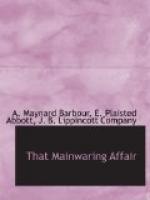“My brother, Harold Scott Mainwaring, and I were twins, so marvelously alike in form and feature that our parents often had difficulty to distinguish between us, but utterly unlike in disposition, except that we both possessed a fiery temper and an indomitable will. He was the soul of honor, generous to a fault, loyal-hearted and brave, and he exacted honor and loyalty from others. He had no petty ambitions; he cared little for wealth for its own sake, still less for its votaries. I was ambitious; I loved wealth for the power which it bestowed; I would sacrifice anything for the attainment of that power, and even my boyish years were tainted with secret envy of my brother, an envy that grew with my growth, till, as we reached years of maturity, the consciousness that he, my senior by only a few hours, was yet to take precedence over me — to possess all that I coveted — became a thorn in my side whose rankling presence I never for a single waking hour forgot; it embittered my enjoyment of the present, my hopes and plans for the future.
“But of this deadly undercurrent flowing far beneath the surface neither he nor others dreamed, till, one day, a woman’s face — cold, cruel, false, but beautiful, bewitchingly, entrancingly beautiful, — came between us, and from that hour all semblance of friendship was at an end. With me it was an infatuation; with him it was love, a love ready to make any sacrifice for its idol. So when our father threatened to disinherit and disown either or both of us, and the false, fickle heart of a woman was laid in the balances against the ancestral estates, I saw my opportunity for seizing the long coveted prize. We each made his choice; my brother sold his birthright for a mess of pottage; his rights were transferred to me, and my ambition was at last gratified.
“Between three and four years later, on the night of November seventeenth, within a few hours preceding his death, my father made a will, revoking the will by which he had disinherited his elder son, and restoring him again to his full right and title to the estate. This was not unexpected to me. Though no words on the subject had passed between us and my brother’s name was never mentioned, I had realized for more than a year that my father was gradually relenting towards the son who had ever been his favorite, and on the last day that he was able to leave his room, I had come upon him unaware in the old picture gallery, standing before the portrait of his elder son, silent and stern, but with the tears coursing down his pallid cheeks. When, therefore, on the night preceding his death, my father demanded that an attorney be summoned, my feelings can be imagined. Just as the prize which I had so long regarded as mine was almost within my grasp, should I permit it to elude me for the gratification of a dying man’s whim? Never! In my rage I could have throttled him then and there without a qualm; fear of the law alone held me back. I tried to dissuade him,




